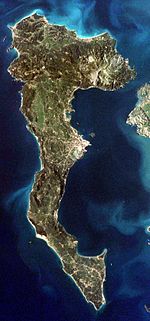Corfu Crisis
| Corfu Incident | |||||||
|---|---|---|---|---|---|---|---|
 Corfu, one of the Ionian Islands |
|||||||
|
|||||||
| Belligerents | |||||||
|
|
|
||||||
| Commanders and leaders | |||||||
|
|
|||||||
| Strength | |||||||
|
2 or 3 battleships |
150 (the Greek garrison) | ||||||
| Casualties and losses | |||||||
| none | 16 civilians killed, 30 injured and 2 amputated or 20 civilians killed and 32 wounded. |
||||||
|
|
|||||||
2 or 3 battleships
2 or 4 cruisers
5 or 6 destroyers
2 Torpedo boats
4 MAS boats
2 submarines
1 airship
airplanes
6 batteries of light artillery
The Corfu Incident was a 1923 diplomatic and military crisis between Greece and Italy. It was triggered when an Italian general heading a commission to resolve a border dispute between Albania and Greece was murdered in Greek territory along with members of his staff. In response, Benito Mussolini issued a severe ultimatum to Greece and when it was not accepted in whole, dispatched forces to bombard and occupy Corfu. Mussolini defied the League of Nations and stated Italy would leave if it arbitrated in the crisis, and the Conference of Ambassadors instead eventually tendered an agreement favoring Italy. This was an early demonstration of the League's weakness when dealing with larger powers.
There was a boundary dispute between Greece and Albania. The two nations took their dispute to the Conference of Ambassadors, which created a commission of British, French, and Italian officials to determine the boundary, which was authorized by the League of Nations to settle the dispute. The Italian General Enrico Tellini became the chairman of the commission. From the outset of the negotiations, the relations between Greece and the commission were negative. Eventually the Greek delegate openly accused Tellini of working in favour of Albania's claims.
...
Wikipedia

